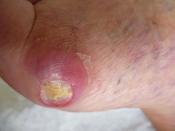Preventative maintenance is a brood term used to describe a variety of steps involved in maintaining the persons current level of health and to prevent some of the avoidable complications of diabetes.
Foot care is involved in the preventative arena. Diabetics must provide meticulous foot care for themselves. Feet must be inspected daily for wounds or injury. A person with diabetes may not be aware of a wound or injury to their foot d/t decreased sensation in their feet, a condition called diabetic neuropathy. Therefore, great care must be taken to inspect the feet everyday. If a wound or injury is found immediate, medical care is required to treat the condition. Routine check ups are also mandated for foot care with a podiatrist. Nail care of the feet will either need to be performed by a nurse, doctor, podiatrist or the patient must be instructed to care for them properly themselves.
Diabetic neuropathy also affects the eyes, retinopathy, increasing the risk for glaucoma and blindness. Eye exams every six months to one year will be needed. The eyes must be checked often as vision can deteriorate quickly in patients with diabetes. Any change in visual accommodation, acuity or clarity needs to be reported immediately.
Patients with DM must also closely monitor their kidney function as renal impairment can occur as a complication of the disease. Any change in urination patterns, such as frequency, urgency, blood in urine, painful urination, strong or foul odor to urine, change in color of urine or noticeable foreign particles (sediment), should be reported as soon as possible.
Patients with cardiovascular disease must take care to avoid exercise the will increase blood pressure and that could induce the Valsalva maneuver. Cycling and walking, which involve the lower extremities, are considered the best form of exercise for...


